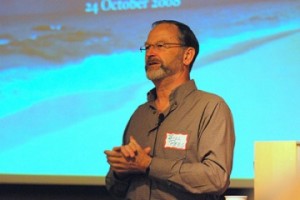
Recently, we had an opportunity to host a variety of great talks for science teachers. One of the talks was by Dr. William Rees. It was a nice little introduction into the conundrum of our reliance on "progress" to fix things. In any event, here is the link that will lead you to a 25 minute talk he gave.
If you do watch it, I'd be interested to see what you think. In many ways it suggests that human behaviour is currently not well suited to dealing with an issue of this magnitude.
Interestingly, one of the questions that came up after the talk, (that I thought really nailed the going feeling in the room) was "Do you think it's important to teach students to hope?"
Thoughts?
There isn't a lot of new information given in Dr. Rees' talk, and he gives very little specifics in the way of solutions other than to stop growing the economy. I'm also confused by his small pointless criticism of efficiency and efficient computer systems with a last century quote based on coal usage as a justification for why efficiency will do nothing to help us. Most educated people already know about these problems as he pointed out; global warming is an inevitable result of our lifestyles, corn ethanol is a boondoggle, the rich are exploiting the poor and it's all precariously balanced on an ever dwindling supply of ancient rotten grease we call petroleum. If the results of these realities are really as bad as he paints it, his solution of a steady-state economy isn't going to solve anything either and we are all going down to our hopeless demise in a torrent of boiling methane hydrates. If we are all doomed anyway what's the point of trying to fight entropy, build windfarms, install solar panels, or even ride our bikes since I'm sure the factory that produces all these has a massive carbon footprint?
At the end of your post you bring up a question "Do you think it's important to teach students to hope?" I would say yes and in order to have some kind of hope I have to disagree with Rees on certain points. Humanity is not stupid. We will adapt, will become more efficient in the use of resources, will preserve knowledge and throw away the extravagant. While we won't be able to avoid some of the painful realities our past hedonistic lifestyles have provided for us, we will survive the coming challenges. Turning away from reality isn't the problem for humanity, the negativity, hopelessness and doomsaying that cause people to turn off from reality is.